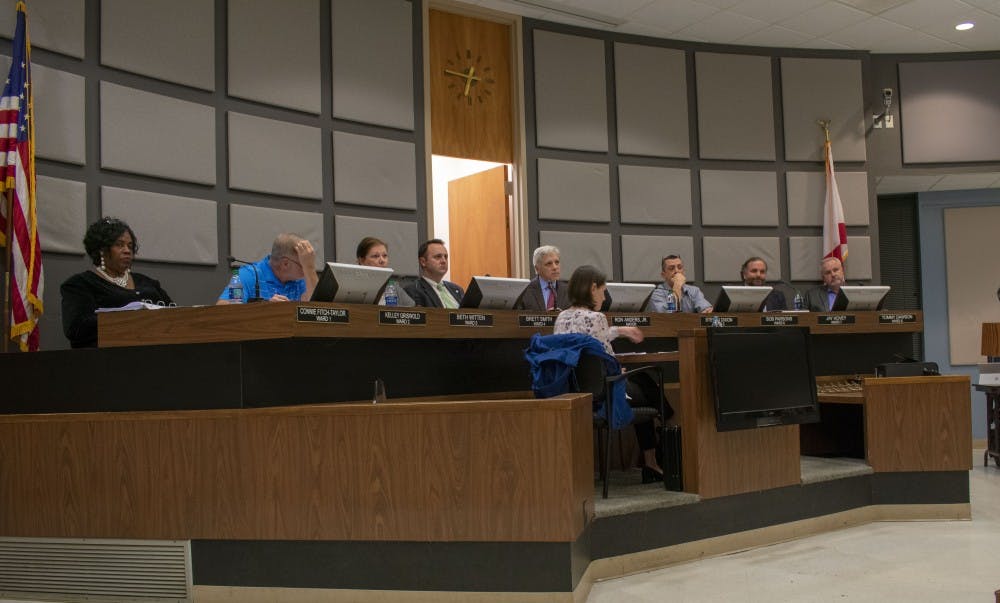The City Council has pushed back a vote on an ordinance that would create two new zoning categories along Harper Avenue at its Tuesday night meeting.
One of the two new zones would allow Academic Detached Dwelling Units on a conditional approval basis, meaning each case would have to be approved by the Planning Commission and the City Council.
ADDUs are typically five-bedroom, five-bath units that are currently unregulated and being built as single-family homes.
Once the ordinance came up at the meeting, Mayor Ron Anders immediately said he did not feel like he knew enough on the issue to move forward with a vote that night.
Other members of the council agreed, and City Manager Jim Buston recommended if the Council did not want to take a vote on the issue Tuesday night, they deny unanimous consent, which will push the issue to the next meeting in April.
“Planning just takes a lot of time to understand,” Anders said in an interview following Tuesday’s meeting. “We didn’t have a workshop on this. We received the information on Friday. I just didn’t feel like I was prepared to make a well-rounded decision on behalf of the citizens of this community on Tuesday night.”
Anders and Ward 5 Councilman Steven Dixon denied unanimous consent for the two ordinances pertaining to the new zoning.
City staff will present information about the ordinances to the Council at their work session on Monday, March 25, 2019, at 4 p.m. in the city meeting room.
At this work session, the Council will also finish going through the ADDU ordinance, which was first brought to the Council in February but was tabled until the Council could discuss it further with city staff to learn more about it and make any changes they see fit.
“There is a lot of interest of doing that here in Auburn,” Anders said. “I really think that in a lot of ways it really folds into the whole idea of student housing in general and how much more student housing do we need in Auburn.”
The new zoning laws will rezone part of the land near Felton Little Park along Summer Hill Road and Harper Avenue within Ward 4.
The area currently features redevelopment district and neighborhood conservation zones.
The zoning ordinance rezones the area to include a comprehensive development district, development district housing and two new zones titled corridor redevelopment district east and medium density residential district.
“If you go over and you actually look at the actual Harper Avenue, there’s some redevelopment that’s going on as properties are being sold,” said Brett Smith, Ward 4 councilman. “I think it’s good that we get as educated [as we can].”
Comprehensive development district east is a sub-district of the zone comprehensive development district that already exists.
It is meant to promote more compact development.
Single-family houses, town houses and duplexes are among the residential developments that would be allowed in this new zone. ADDUs are not permitted, according to documents presented with the Council’s agenda.
Medium density residential district is a completely new zoning classification. It is based on the development district housing zone but is meant to encourage more housing at a higher density. It is supposed to serve as a transition between development district housing and other zones.
Just like the other new zone comprehensive development district east, housing such as single-family houses and duplexes are permitted outright.
ADDUs, however, are permitted conditionally, meaning each ADDU development must be approved by the Planning Commission and the Council, according to documents presented with the Council’s agenda.
Non-residential development, such as churches, day care centers and community recreation centers, are permitted conditionally in each of the two new zones, according to documents presented with the Council’s agenda.
“We could sit up here, and we can deliberate, and we can talk about it, but you’ve got to listen to the experts,” Smith said.
They began revisiting the land use plans for the Harper Avenue area in June 2018.
City staff contacted area stakeholders and requested feedback on the current and future land-use plans.
These changes would affect about 800 people, Planning Director Forrest Cotton said in an interview following Tuesday night’s meeting.
Staff also hosted an open house where they received mostly favorable comments from residents that attended. Two residents that attended expressed concerns, according to documents presented with the Council’s agenda.
The Planning Commission then began to review staff recommendations and the proposed changes to the Harper Avenue area.
When the Planning Commission first heard this zoning ordinance in August, concern about ADDUs and other student-housing types were brought to the commission.
Commission members decided to put a hold on the zoning ordinance until those issues were resolved, according to documents presented with the Council’s agenda.
“The big thing to me with Harper Avenue is it’s a connector to our business and commerce area, but it also has a lot of traditional neighborhoods,” Smith said. “We need to make sure every step that we’re taking, we’re protecting those neighborhoods.”
At their January meeting, the Planning Commission recommended the City Council approve the ADDU ordinance. The City Council first heard the ordinance at their Feb. 19, meeting but did not vote on it.
Councilmembers have met with city staff individually and as a group to discuss the ordinance further since that February meeting.
They are expected to vote on it at the Council’s first April meeting.
“My sense was the best thing was to ask the Council’s permission and for us just to kind of sit on this for two weeks and allow us some time to study and understand it,” Anders said. “Then, we can make a well-rounded, well-founded decision.”
Do you like this story? The Plainsman doesn't accept money from tuition or student fees, and we don't charge a subscription fee. But you can donate to support The Plainsman.

Elizabeth, senior in journalism and political science, is the community editor for The Plainsman





